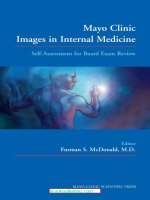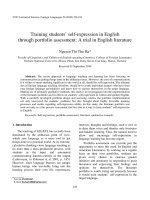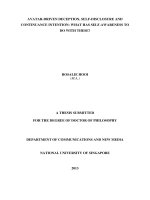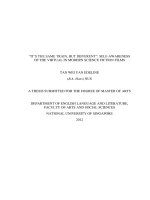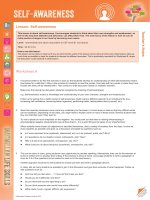self awareness assessment
Bạn đang xem bản rút gọn của tài liệu. Xem và tải ngay bản đầy đủ của tài liệu tại đây (1.09 MB, 17 trang )
<span class="text_page_counter">Trang 1</span><div class="page_container" data-page="1">
<b>Name: Ngo Thi Ha Trang.Student ID: SS140376.Class: FIN1402.Subject: SSM201.</b>
<b>SELF-AWARENESS ASSESSMENT</b>
Step 1: Before you read the material in this chapter, please respond to the followingstatements by writing a number from the rating scale below in the left-hand column(Preassessment). Your answers should reflect your attitudes and behavior as theyare now, not as you would like them to be. Be honest. This instrument is designedto help you discover how self-aware you are so you can tailor your learning to yourspecific needs. When you have completed the survey, use the scoring key at theend of the chapter to identify the skill areas discussed in this chapter that are mostimportant for you to master.
Step 2: After you have completed the reading and the exercises in this chapter and,ideally, as many of the Skill Application assignments at the end of this chapter asyou can, cover up your first set of answers. Then respond to the same statementsagain, this time in the right-hand column (Post-assessment). When you havecompleted the survey, use the scoring key at the end of the chapter to measure yourprogress. If your score remains low in specific skill areas, use the behavioralguidelines at the end of the Skill Learning section to guide further practice.Rating Scale
1 Strongly disagree2 Disagree3 Slightly disagree4 Slightly agree5 Agree6 Strongly agree
Pre-
</div><span class="text_page_counter">Trang 2</span><div class="page_container" data-page="2">Post-4 5 1. I seek information about my strengths and weaknesses fromothers as a basis for self-improvement.
4 4 2. When I receive negative feedback about myself from others,I do not get angry or defensive.
3 2 3. In order to improve, I am willing to be self-disclosing toothers (that is, to share my beliefs and feelings).
4 4 4. I am aware of my personal cognitive style and how I processinformation.
4 3 5. I have a good grasp of what it means to be emotionallymature, and I demonstrate that capability.
2 3 6. I have a good sense of how I cope with situations that areambiguous and uncertain.
4 3 7. I have a well-developed set of personal standards andprinciples that guide my behavior.
5 5 8. I feel in charge of what happens to me, good and bad.3 3 9. I seldom, if ever, feel angry, depressed, or anxious without
<b>EMOTIONAL INTELLIGENCE ASSESSMENT</b>
Please reply to each item below by selecting the one alternative that is most likelyto be your response. Think about the way you usually respond to these kinds ofsituations, not the way you would like to respond or the way you think you shouldrespond. No correct answers exist for any of the items, and your scores will bemost useful if you provide an accurate assessment of your typical behavior. Markonly one answer per item.
1. When I get really upset, I . . .a. Analyze why I am so disturbed.b. Blow up and let off steam.c. Hide it and remain calm.
</div><span class="text_page_counter">Trang 3</span><div class="page_container" data-page="3">2. In a situation in which a colleague takes credit in public for my work and myideas, I would probably . . .
a. Let it slide and do nothing in order to avoid a confrontation.
b. Later—in private—indicate that I would appreciate being given credit for mywork and ideas.
c. Thank the person in public for referencing my work and ideas and then elaborateon my contributions.
3. When I approach another person and try to strike up a conversation but the otherperson doesn’t respond, I . . .
a. Try to cheer up the person by sharing a funny story.
b. Ask the person if he or she wants to talk about what’s on his or her mind.c. Leave the person alone and find someone else to talk to.
4. When I enter a social group I usually . . .a. Remain quiet and wait for people to talk to me.b. Try to find something complimentary I can tell someone.
c. Find ways to be the life of the party or the source of energy and fun.5. On important issues I usually . . .
a. Make up my own mind and ignore others’ opinions.
b. Weigh both sides, and discuss it with others before making a decision.c. Listen to my friends or colleagues and make the same decision they do.6. When someone that I do not particularly like becomes romantically attracted tome, I usually . . .
a. Tell that person directly that I am not interested.b. Respond by being friendly but cool or aloof.c. Ignore the person and try to avoid him or her.
7. When I am in the company of two people who have diametrically opposingpoints of view about an issue (for example, politics, abortion, war) and are arguingabout it, I . . .
</div><span class="text_page_counter">Trang 4</span><div class="page_container" data-page="4">a. Find something upon which they can both agree and emphasize it.b. Encourage the verbal battle.
c. Suggest that they stop arguing and calm down.
8. When I am playing a sport and the game comes down to my last-secondperformance, I . . .
a. Get very nervous and hope that I don’t choke.b. See this as an opportunity to shine.
c. Stay focused and give it my best effort.
9. In a situation in which I have an important obligation and need to leave workearly, but my colleagues ask me to stay to meet a deadline, I would probably . . .a. Cancel my obligation and stay to complete the deadline.
b. Exaggerate a bit by telling my colleagues that I have an emergency that I can’tmiss.
c. Require some kind of compensation for missing the obligation.
10. In a situation in which another person becomes very angry and begins yellingat me, I . . .
a. Get angry in return. I don’t take that from anyone.b. Walk away. It doesn’t do any good to argue.c. Listen first, and then try to discuss the issue.
11. When I encounter someone who has just experienced a major loss or tragedy, I .. .
a. Really don’t know what to do or say.
b. Tell the person I feel very sorry and try to provide support.c. Share a time when I experienced a similar loss or tragedy.
12. When someone makes a racist joke or tells a crude story about a member of theopposite sex in mixed company, I usually . . .
a. Point out that this is inappropriate and not acceptable, and then change thesubject.
</div><span class="text_page_counter">Trang 5</span><div class="page_container" data-page="5">b. Ignore it so I don’t cause a scene.
c. Get really upset and tell the person just what I think of what he or she said.
<b>TOTAL: 50 </b>
<b>THE DEFINING ISSUES TEST</b>
This instrument assesses your opinions about controversial social issues. Differentpeople make decisions about these issues in different ways. You should answer thequestions for yourself without discussing them with others. You are presented withthree stories. Following each story are 12 statements or questions. Your task afterreading the story is to rate each statement in terms of its importance in making adecision. After rating each statement, select the four most important statements andrank them from one to four in the spaces provided. Each statement should beranked in terms of its relative importance in making a decision.
Some statements will raise important issues, but you should ask yourself whetherthe decision should rest on that issue. Some statements sound high and lofty but arelargely gibberish. If you cannot make sense of a statement, or if you don’tunderstand its meaning, mark it 5—“Of no importance.” For information aboutinterpreting and scoring the Defining Issues Test, refer to the scoring key at the endof the chapter. Use the following rating scale for your response.
importance
This statement or question involves something you careabout, but it is not of great importance in reaching adecision.
4 Of little importance This statement or question is not very important toconsider in this case.
5 Of no importance This statement or question is completely unimportant inmaking a decision. You would waste your time thinkingabout it.
<b>THE ESCAPED PRISONER</b>
</div><span class="text_page_counter">Trang 6</span><div class="page_container" data-page="6">A man had been sentenced to prison for 10 years. After one year, however, heescaped from prison, moved to a new area of the country, and took on the name ofThompson. For eight years he worked hard, and gradually he saved enough moneyto buy his own business. He was fair to his customers, gave his employees topwages, and gave most of his own profits to charity. Then one day, Ms. Jones, anold neighbor, recognized him as the man who had escaped from prison eight yearsbefore and for whom the police had been looking.
Should Ms. Jones report Mr. Thompson to the police and have him sent back toprison? Write a number from the rating scale on the previous page in the blankbeside each statement.
_______ Should report him_______ Can’t decide_______ Should not report himImportance
___3__ 1. Hasn’t Mr. Thompson been good enough for such a long time to provehe isn’t a bad person?
___4__ 2. Every time someone escapes punishment for a crime, doesn’t that justencourage more crime?
___3__ 3. Wouldn’t we be better off without prisons and the oppression of ourlegal system?
___3__ 4. Has Mr. Thompson really paid his debt to society?
___5__ 5. Would society be failing what Mr. Thompson should fairly expect?___4__ 6. What benefit would prison be apart from society, especially for acharitable man?
___4__ 7. How could anyone be so cruel and heartless as to send Mr. Thompson toprison?
___4__ 8. Would it be fair to prisoners who have to serve out their full sentences ifMr. Thompson is let off?
___3__ 9. Was Ms. Jones a good friend of Mr. Thompson?
</div><span class="text_page_counter">Trang 7</span><div class="page_container" data-page="7">___3__ 10. Wouldn’t it be a citizen’s duty to report an escaped criminal, regardlessof the circumstances?
___5__ 11. How would the will of the people and the public good best be served?__5__ 12. Would going to prison do any good for Mr. Thompson or protectanybody?
<i>From the list of questions above, select the four most important:</i>
___2___ Most important___3___ Second most important___10__ Third most important
<b>TOTAL: 7/12</b>
<b>THE DOCTOR’S DILEMMA</b>
A woman was dying of incurable cancer and had only about six months to live. Shewas in terrible pain, but was so weak that a large dose of a pain killer such asmorphine would probably kill her. She was delirious with pain, and in her calmperiods, she would ask her doctor to give her enough morphine to kill her. She saidshe couldn’t stand the pain and that she was going to die in a few months anyway.
<i>What should the doctor do? (Check one.)</i>
_______ He should give the woman an overdose that will make her die______ Can’t decide
_______ Should not give the overdoseImportance
___2__ 1. Is the woman’s family in favor of giving her the overdose?___4__ 2. Is the doctor obligated by the same laws as everybody else?
___2__ 3. Would people be better off without society regimenting their lives andeven their deaths?
___5__ 4. Should the doctor make the woman’s death from a drug overdose appearto be an accident?
</div><span class="text_page_counter">Trang 8</span><div class="page_container" data-page="8">___5__ 5. Does the state have the right to force continued existence on those whodon’t want to live?
___4__ 6. What is the value of death prior to society’s perspective on personalvalues?
___3__ 7. Should the doctor have sympathy for the woman’s suffering, or shouldhe care more about what society might think?
___4__ 8. Is helping to end another’s life ever a responsible act of cooperation?___4__ 9. Can only God decide when a person’s life should end?
___3__ 10. What values has the doctor set for himself in his own personal code ofbehavior?
___4__ 11. Can society afford to let anybody end his or her life whenever he or shedesires?
___3__ 12. Can society allow suicide or mercy killing and still protect the lives ofindividuals who want to live?
<i>From the list of questions above, select the four most important:</i>
___8___ Most important___1___ Second most important___10__ Third most important___3___ Fourth most important
<b>TOTAL: 6/12</b>
<b>THE NEWSPAPER</b>
Rami, a senior in high school, wanted to publish a mimeographed newspaper forstudents so that he could express his opinions. He wanted to speak out againstmilitary build-up and some of the school’s rules, such as the rule forbidding boysto wear long hair.
When Rami started his newspaper, he asked his principal for permission. Theprincipal said it would be all right if before every publication Rami would turn inall his articles for the principal’s approval. Rami agreed and turned in several
</div><span class="text_page_counter">Trang 9</span><div class="page_container" data-page="9">articles for approval. The principal approved all of them and he published twoissues of the paper in the next two weeks.
But, the principal had not expected that Rami’s newspaper would receive so muchattention. Students were so excited by the paper that they began to organizeprotests against the government, hair regulation, and other school rules. Angryparents objected to Rami’s opinions. They phoned the principal telling him that thenewspaper was unpatriotic and should not be published. As a result of the risingexcitement, the principal wondered if he should order Rami to stop publishing onthe grounds that the controversial newspaper articles were disrupting the operationof the school.
<i>What should the principal do? (Check one.)</i>
______ Should stop it_______ Can’t decide_______ Should not stop itImportance
___4__ 1. Is the principal more responsible to the students or to the parents?___4__ 2. Did the principal give his word that the newspaper could be publishedfor a long time, or did he just promise to approve the newspaper one issue at atime?
___4__ 3. Would the students start protesting even more if the principal stoppedthe newspaper?
___3__ 4. When the welfare of the school is threatened, does the principal have theright to give orders to students?
___3__ 5. Does the principal have the freedom of speech to say no in this case?___3__ 6. If the principal stopped the newspaper, would he be preventing fulldiscussion of important problems?
___4__ 7. Would the principal’s stop order make Rami lose faith in him?___3__ 8. Is Rami really loyal to his school and patriotic to his country?
___3__ 9. What effect would stopping the paper have on the students’ education incritical thinking and judgment?
</div><span class="text_page_counter">Trang 10</span><div class="page_container" data-page="10">___5__ 10. Is Rami in any way violating the rights of others in publishing his ownopinions?
___4__ 11. Should the principal be influenced by some angry parents when it is theprincipal who knows best what is going on in the school?
___3__ 12. Is Rami using the newspaper to stir up hatred and discontent?
<i>From the list of questions above, select the four most important:</i>
___9___ Most important___6___ Second most important___3___ Third most important___1___ Fourth most important
<b>TOTAL: 6/12</b>
<b>COGNITIVE STYLE INDICATOR</b>
This instrument assesses the way you gather and evaluate information and makedecisions. There are no right or wrong answers, and the accuracy of your resultswill depend on the extent to which you honestly answer each question. Please usethe following scale in responding to each item:
Rating Scale1 Totally disagree2 Disagree
3 Neither agree nor disagree4 Agree
5 Totally agree
___4__ 1. Developing a clear plan is very important to me.___3__ 2. I like to contribute to innovative solutions.___3__ 3. I always want to know what should be done when.___4__ 4. I prefer to look at creative solutions.
</div>